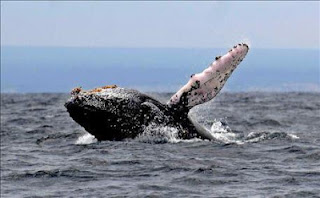The International Whaling Commission (IWC), the body responsible for the international regulation of marine mammals, concluded its 64th annual meeting a few days ago in Panama City, where it approved quotas for aboriginal subsistence hunting for the next 6 years and rejected the creation of a sanctuary in the South Atlantic (one of the main expectations at the beginning of the meeting), among other measures after five days of plenary deliberations.
During the meeting (last of the annual regime) of the IWC, the proposals presented by Denmark, Japan and Monaco were not supported, marking once again deep differences between those who promote a conservation policy for cetaceans (among them Ecuador) and those who promote their hunting for commercial use.
The Ecuadorian delegation included representatives from the Ministry of Environment, Foreign Affairs, Trade and Integration, as well as scientists and conservation representatives from civil society, who reaffirmed the country's position on the moratorium on whaling in force since 1984.
The IWC has approved the renewal of the quotas for aboriginal subsistence whaling for the United States, Russia and Saint Vincent and the Grenadines, after a heated discussion in which the Latin American-led bloc objected to the inclusion of the Caribbean archipelago, considering that it has not yet complied with the requirements demanded by the organization (lack of information and repeated violations committed due to the capture of mothers with calves).
Sanctuary
The most controversial proposal, which was ultimately rejected, was that put forward by the so-called Buenos Aires Group (Latin America) to create a whale sanctuary in the South Atlantic. Although it was supported by 38 of the 61 countries present at the meeting, it did not reach the 75% required by the IWC statutes.
Despite the “setback,” activists like Vanessa Tossemberger of the Whale and Dolphin Conservation Society said it was important to remember that “the proposal was put to a vote eleven years after it was proposed in the plenary session… which gives us encouragement to continue working.”
The IWC announced a change to its biennial meeting schedule, meaning the next meeting will be held in 2014 in a country yet to be determined.
![]()

